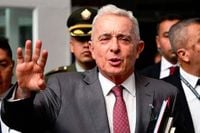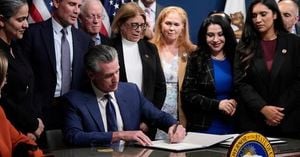On August 19, 2025, Colombia’s legal and political landscape was shaken by a dramatic decision: the Superior Court in Bogotá ordered the immediate release of former President Álvaro Uribe from house arrest, pending the outcome of his appeal on charges of bribery and witness tampering. This landmark ruling not only freed the country’s most influential conservative leader but also reignited fierce debate across Colombia and beyond about justice, politics, and the rule of law.
Uribe, who governed Colombia from 2002 to 2010, has long been a towering, polarizing figure. Admired by many for his unyielding military campaign against drug cartels and the FARC guerrilla army, he is equally criticized for alleged human rights abuses and his connections to right-wing paramilitary groups. As reported by Agence France-Presse and Inquirer, his conviction earlier in August marked the first time in Colombia’s history that a former president had been found guilty of a crime. The sentence—12 years of house arrest—was the maximum allowed, underscoring the gravity of the charges.
The case against Uribe originated in 2012, when he filed a libel suit against left-wing legislator Iván Cepeda. Cepeda had collected statements from former paramilitaries accusing Uribe of helping to found Bloque Metro, a group notorious for defending ranchers against rebel attacks. In a twist, Colombia’s Supreme Court dismissed Uribe’s suit in 2018 and instead opened an investigation into Uribe himself, suspecting him of attempting to obstruct justice by pressuring witnesses to retract their statements about his alleged paramilitary ties.
By July 2025, Judge Sandra Heredia determined there was sufficient evidence that Uribe conspired with a lawyer to persuade three imprisoned ex-paramilitaries to change their testimonies. Shortly after convicting him, Judge Heredia ordered Uribe’s immediate house arrest, arguing that such a high-profile figure needed to be detained to preserve "the peaceful coexistence of citizens" and to show that no one is above the law. She also cited the risk of flight, noting Uribe’s extensive international connections.
Uribe’s defense team, however, maintained that the evidence was obtained illegally and that his meetings with the prisoners were legitimate efforts to prepare for his own trial and to clarify testimonies relevant to a murder case against his brother, Santiago Uribe. They argued that the arrest order violated his right to due process and the presumption of innocence—a claim that gained traction with the Superior Court in Bogotá.
On August 19, the Superior Court sided with Uribe’s lawyers, approving an injunction for his release. The court found that Judge Heredia had relied on "vague reasoning" to justify the arrest and concluded that Uribe’s rights to equal treatment under the law had been violated. The court further dismissed fears that Uribe would flee, pointing out that he had traveled abroad multiple times during the trial and had always returned to face justice. As BBC and AFP reported, the court’s decision means Uribe is now free to move about while the appeal is pending, a process the court must resolve by October 16, 2025. If the court misses this deadline, the trial will be annulled and Uribe will go free.
The reaction was immediate and intense. Uribe took to social media platform X to express his gratitude, writing, "Thanks to God, thanks to so many fellow Colombians for their expressions of solidarity. I will dedicate every minute of my freedom to the freedom of Colombia." His words echoed the loyalty he commands among conservatives, many of whom credit him with saving Colombia from collapse during the turbulent 2000s. Recent polls, cited by AFP, still rank Uribe as the country’s most beloved politician, despite—or perhaps because of—his legal troubles.
But the saga has deeply divided Colombia. For Uribe’s supporters, the charges and conviction are seen as a politically motivated attack orchestrated by the country’s left, now represented by President Gustavo Petro. Uribe himself has claimed the trial was instigated by Petro’s government, which he describes as radical and adversarial. Petro, a former guerrilla and Uribe’s longtime political rival, has publicly questioned the United States’ involvement and the pressure it places on Colombia’s judiciary. "I do not understand how Uribe is free," Petro declared during a televised meeting, adding pointedly, "Is that justice?"
The case has also drawn the attention—and criticism—of international figures. U.S. Secretary of State Marco Rubio, for instance, denounced the prosecution as "the weaponization of Colombia’s judicial branch by radical judges," though he offered no evidence for his claim. According to Inquirer, Rubio’s comments highlight the enduring ties between Uribe and the American right, as well as the geopolitical stakes of the case.
The legal proceedings themselves have been exhaustive. More than 90 witnesses testified during the trial, which began in May 2024. Prosecutors presented evidence that included statements from at least one ex-paramilitary fighter who claimed Uribe contacted him to change his story about their connections. The investigation, which began in 2018, saw several attorneys general attempt to close the case before it gained momentum under Attorney General Luz Camargo, an appointee of President Petro.
Uribe’s legacy looms large over Colombian politics. As president, he led a relentless campaign against both drug cartels and the FARC, pushing the rebels into peace negotiations and transforming himself into an icon of Latin American conservatism. Yet his tenure was marred by the so-called "false positives" scandal, in which thousands of young people were killed by the military and falsely presented as rebels to inflate body counts—a dark chapter that continues to haunt his reputation.
The current legal drama, then, is about more than just one man’s fate. It’s a test of Colombia’s institutions, the independence of its judiciary, and the resilience of its democracy. As the October deadline approaches, all eyes will remain on Bogotá’s Superior Court. Will it uphold Uribe’s conviction, setting a new precedent for accountability at the highest levels? Or will the case collapse under the weight of political pressure and procedural wrangling?
For now, Álvaro Uribe walks free, a reminder of both the reach and the limits of justice in a country still grappling with its past and uncertain about its future.





